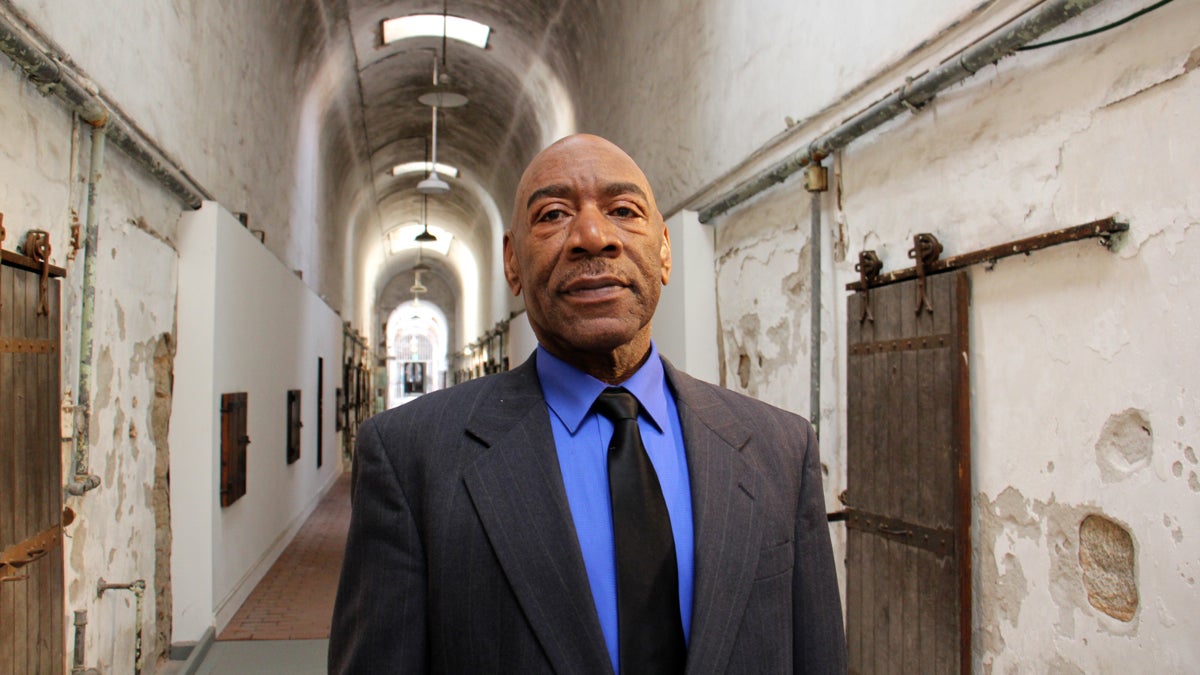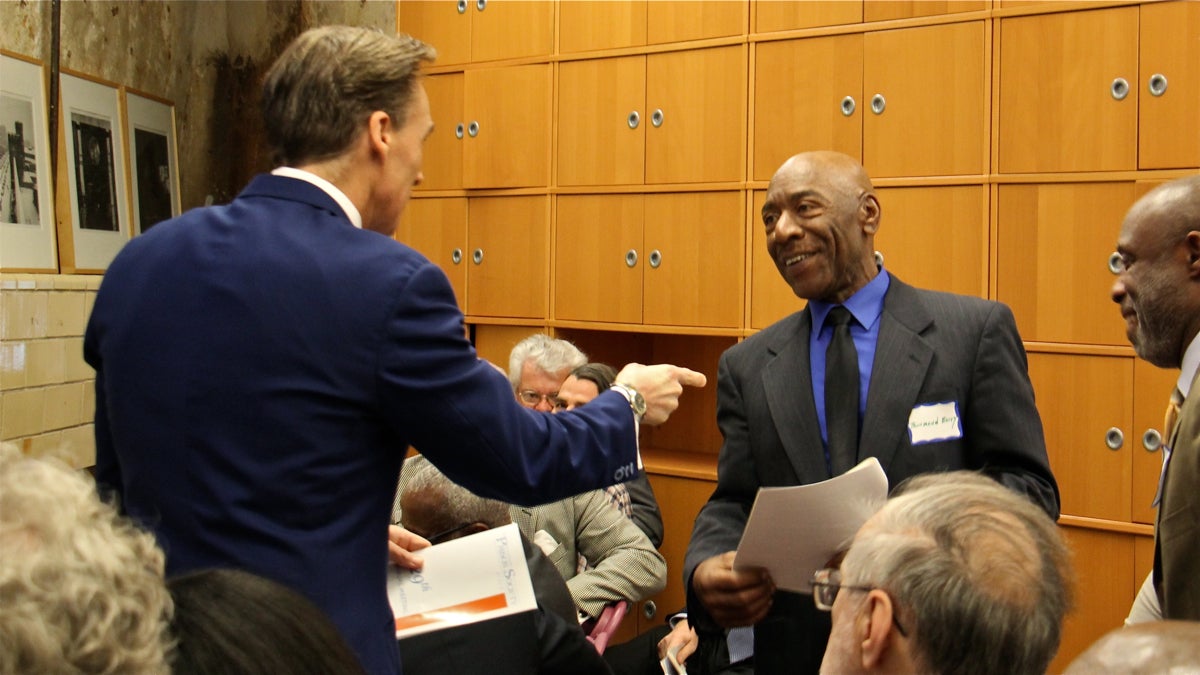With commutation, the window to freedom opens a crack for lifers in Pa.
Listen
Thurmond Berry served 39 years in prison before his life sentence was commuted by Gov. Tom Wolf earlier this year. (Emma Lee/WHYY)
In the commonwealth, as the saying goes, “life means life.” First and second degree murder charges carry a mandatory life sentence without parole.
In 1976, 29-year-old Thurmond Berry faced murder charges, for being an accomplice in a robbery during which someone else killed a bystander.
Berry had no prior criminal record and wanted to plead not guilty. His lawyer, however, advised him to accept the murder charge.
“I was ignorant of the law, big time,” he said. “I had no idea.”
Berry joined Pennsylvania’s nearly 5,400 inmates serving life sentences without possibility of parole, second in number only to Florida.
Sentencing and a ballooning population of lifers
In the commonwealth, as the saying goes, “life means life.” First and second degree murder convictions carry a mandatory life sentence without parole.
Berry’s case is a typical example of the broad application of second degree murder under Pennsylvania law.
With parole off the table, the only way to limit a life sentence (besides winning an appeal) is to have a sentence commuted — or lessened — by the Board of Pardons.
How that board has treated commutations — and how inmates, lawyers and advocates view life in prison — has varied dramatically at different points in time in Pennsylvania.
Commutations by the numbers
When Berry plead guilty to murder, other people serving life sentences could earn commutations and get out early. Then-governor Milton Shapp lessened 251 life sentences during his tenure.
At that time, commutation served as the logical conclusion of the rehabilitation process.
In the 1980s — “tough on crime era” — the number of commutations dropped, but lifers could still earn release through a combination of good behavior, time served and good relationships with prison staff.
In 1994, the Board of Pardons and Governor Robert Casey made a fatal mistake in commuting the sentence of Reginald McFadden.
McFadden, locked up at 16 for murder, had served 25 years of a life sentence. He’d curried favor with prison staff by turning in other inmates who had planned to attack a guard, but his record included several red flags, including attacks on other inmates.
Following his commutation, the Board of Pardons also bungled McFadden’s paperwork, mistakenly eliminating a parole period following his release and sending him straight out into society. McFadden went to New York and killed three people in three months, raping and imprisoning another woman.
Outcry over his new, heinous crimes prompted a change to Pennsylvania’s constitution, requiring a unanimous vote by the Board of Pardons and making the vetting process more thorough.
Those changes — and the horrible example set by McFadden — made the road to commutation much steeper. In the 20 years following his release, Pennsylvania governors granted six commutations — five under Ed Rendell. Governors Tom Corbett and Tom Ridge signed zero commutations.
California hands out way more life sentences but has fewer people serving life without parole.
“It’s not smart.”
Under Democratic Governor Tom Wolf, attitudes have shifted. Nationally, “smart on crime” policies are replacing “tough on crime” sentencing.
“It’s not really smart to keep these people in prison forever … if they’ve demonstrated they can make a positive impact,” said Lieutenant Governor Mike Stack, who chairs the Board of Pardons now.
 Lt. Gov. Mike Stack speaks at a meeting of the Pennsylvania Prison Society at Eastern State Penitentiary. (Emma Lee/WHYY)
Lt. Gov. Mike Stack speaks at a meeting of the Pennsylvania Prison Society at Eastern State Penitentiary. (Emma Lee/WHYY)
“It’s stupid for taxpayers to continue to spend exorbitant amount of money keeping people behind bars,” he said. For example, he said elderly prisoners — who are unlikely to reoffend — place an enormous financial burden on the state.
Stack’s office and the Board of Pardons has tried to smooth the way for more pardons and commutations — hiring another staff person and digitizing processes that used to take place on pen and paper. Stack said he has also scheduled more hearings than previous lieutenant governors.
The laws and much of the process remain the same, so commutations can’t exactly speed through, but in the case of Thurmond Berry, worthy applicants can now get a hearing.
During his 39 years in prison, Berry applied for commutation over and over again.
“Five times I was denied. It got so bad, every time you get some legal mail or something, first thing you do is look at the bottom to see if you get denied, denied, denied,” he said. “That thing hurt so bad.”
Last year, Berry got help. An advocate inside the Department of Corrections gave his name to a Kathleen Brown, a professor at the University of Pennsylvania. Brown’s students had been doing legal research to support other commutation cases, with no success. They signed up to support Berry in writing his sixth application.
Last year, he made it through interviews with prison staff and psychologists, all the way to a sit-down in front of the Board of Pardons.
“Initially, they were looking at me like a I was a pariah or a menace to society,” he said. Berry had an hour to explain his case to the board of five people, who all had to agree to grant him a commutation.
After he finished reading the first page of his prepared statement, the mood had lifted.
“I was now longer being stared at,” he said. “I was being, you know, listened to … like a human being.”
Berry — now 68 — became one of the first two people to get the board’s approval for commutation in six years. He spends his time catching up with this daughter, a nurse, and helping in-laws with declining health.
 Lt. Gov. Mike Stack greets Thurmond Berry at a meeting of the Pennsylvania Prison Society. Stack was instrumental in getting Berry’s life sentence commuted. (Emma Lee/WHYY)
Lt. Gov. Mike Stack greets Thurmond Berry at a meeting of the Pennsylvania Prison Society. Stack was instrumental in getting Berry’s life sentence commuted. (Emma Lee/WHYY)
Berry is also a bit of a spokesman and poster child for commutations in 2016. As Pennsylvania prepares to navigate the outcome of a 2012 Supreme Court ruling calling for the resentencing of hundreds of people serving life sentences who were convicted as juveniles, he’s been asked to talk to inmates about transitioning.
He knows now his good behavior on the outside is the key to giving this opportunity to others, because his commutation has offered new hope for release to many serving life sentences.
“A lot of them gave up,” he said. “They just said the hell with it. They wouldn’t apply. Period … but after my success, that lit a fire under so many people. You could see the joy. You could feel it.”
That joy has translated into translated into more applications — and more work — for the Board of Pardons, according to Stack. Since Berry’s commutation, one other person earned release and there are currently 54 applications for commutation up for review.
WHYY is your source for fact-based, in-depth journalism and information. As a nonprofit organization, we rely on financial support from readers like you. Please give today.




